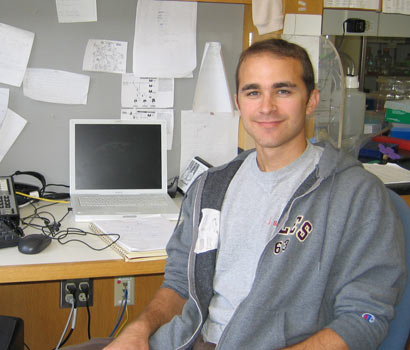Christopher Murphy
This year’s Peralta Prize has been awarded to Christopher Murphy of the Matt Michael lab in MCB for his graduate work, “Mechanism of Checkpoint Activation at the Midblastula Transition”.
The annual Prize recognizes the single outstanding dissertation proposal submitted by 2nd year graduate students and includes $1500 travel and $1000 personal awards. It is given in memory of Prof. Ernest Peralta of MCB.
Chris Murphy’s work focuses on the mechanisms of checkpoint control in very early development. After fertization, embryos undergo a period of rapid, synchronous cell divisions known as the cleavage divisions, in which the egg is subdivided into a large number of smaller cells. At the midblastula transition (MBT), the cell cycle lengthens, becomes asynchronous, and embryonic gene transcription begins for the first time. These changes are specifically dependent on the activivity of checkpoint kinase 1 (Chk1), a protein know to function in the normal cell cycle to halt cell division in response to DNA damage. Murphy notes: “the developmental activation of chk1 at the MBT, which presumably occurs without the presence of damaged DNA, is not understood. Using Xenopus egg extracts as an experimental system, I would like to identify and understand the biochemical mechanism that leads to the activation of chk1 in this context.”
In presenting the award at this year’s MCB retreat, Prof. Markus Meister noted that Murphy “has the courage to take on a very ambitious project, is smart, critical, thoughtful, experimentally skilled, and well-read.” In his dissertation presentation, he “did an excellent job of explaining both the minutiae and the big picture of why the work matters.” For these qualities and for the interest of his work, Murphy recalls Prof. Peralta, the late MCB Professor, died in 1999 at the age of 40.
Though his career was cut tragically short, Prof. Peralta had already a considerable record of outstanding achievement. As Prof. Meister remarked at the MCB retreat, “As a post-doc, [Ernie] gained fame by cloning and expressing the genes for muscarinic acetylcholine receptors. Acetylcholine is an important neurotransmitter and modulator, and the specific receptors Ernie worked on are involved in regulating the frequency of heartbeats. After he came to Harvard, Ernie followed with a beautiful series of studies that eventually laid out the entire molecular pathway by which this modulation is accomplished.”
Prof. Peralta was also a devoted teacher and always welcomed and engaged with students. The Prize exemplifies his enthusiasm for fresh work and the Department’s commitment to recognition of its newer citizens. In this spirit, Chris’s advisor, Prof. Michael, remarked, “Chris earned this recognition by virtue of his terrific performance during his qualifying exam and through hard work in the lab….I fully expect that he will complete a fabulous thesis and that he will enjoy success throughout his scientific career.”


